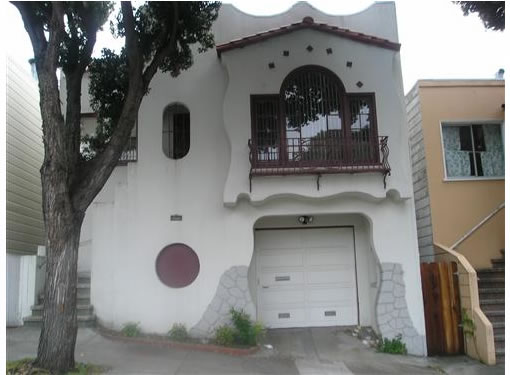
A year ago 1477 Hudson Avenue in Bayview sold for $760,000 and became a “local market comp.” Two months ago the house hit the market for $788,000. And after a couple of reductions, the house is now listed at $670,000 (“This is a short sale subject to lenders approval”).
∙ Listing: 1477 Hudson Avenue (4/2) – $670,000 [MLS]

What is involved in a short sale?
A short sale is when you sell your house for a loss, and the bank (lender) agrees to eat the loss. I believe the homeowner (seller) will still need to pay taxes on the loss. Maybe a sign of things to come?
That’s exactly how a short sale works. A person can’t afford the payments and is unable to sell for enough to break even, so they essentially give the house back to the bank and let the bank sell it to try and recover the funds, or as much as possible. Likely some flipper, now the bank is trying to get its principal back before it’s forced to foreclose.
Banks don’t like these types of properties and are usually willing to drop prices and eat a write-off so long as they can quickly get it off their hands. And, depending on how it’s handled, previous owner may be responsible for taxes and any leftover debt.
This is a prime example for all of the aspiring millionaire investors out there, of how leverage works in reverse.
Assuming the current owners are investors, what were they thinking? It’s a lot of house…but at $760000, in that location, there is very little appreciation upside for the foreseeable future; particularly as interest rates begin inching up towards the magical 7% mark.
what’s the magical 7% mark?
dsp, 7% is a pyschological level widely used by industry people below which mortgage rates are considered to be “low.”
I understand that the owner of an identical house a few doors up is considering listing his place for $760K, because “that’s what his friend got last year” and “it’s the same house”.
Shades of the Madonna Inn on that interior there. Axe the palm tree and that roof would get a much better view.
As Fred mentioned, historically anything below 7% is considered “low.” If the perception is that “cheap leverage” is no longer available this will have a big impact on the decisions of investors who will either request an equivalent reduction in pricing on a given property to offset the increase in interest rates, or alternatively they will decide to stay on the sidelines and put their money elsewhere.
Bayview Home Blog beat you to the punch.
http://bvhp.blogspot.com/2007/06/my-favorite-disney-house-1477-hudson.html
The Chronicle has had a couple of articles about short sales lately-
Short sale can help homeowner facing foreclosure
Lenders must report forgiven debt to IRS:
Loan modification amount considered as taxable income
Thanks everyone for the great articles and info on short sales.
OK, I’m confused. Why does it look like there are pictures of two kitchens, one remodeled and the other from the 1960s? Did the owner remodel 1/2 of the kitchen and leave the other half as is?
How can under 7% be the “historical” marker when interest rates never fell below 7% from 1968 to 2001?
rg – great point. The average rate on 30 year fixed mortgages was 9.3% from 1970 to 2005. Mortgage rates were above 10% consistently from 1978 through 1985. 7% is still low by historical standards.
My only conjecture is that, since it’s different here, maybe the only valid history is 2001 to 2005? So for San Franciscans, “average” appreciation is expected to be 12% a year while mortgage rates are expected to be 5%.
Valid point…perhaps the use of the word “historical” was not appropriate in this instance. However I still believe 7% is a significant physcological marker for a lot of people.
“OK, I’m confused. Why does it look like there are pictures of two kitchens, one remodeled and the other from the 1960s?”
It’s usually a sign of an unwarranted in-law apartment below.
What area is this? Perhaps this is a great opportunity to buy and live? Can someone tell me about this area? Looks like prety good value. thnx.
Dude, I always like your points on this site and appreciate your knowledge, but if I hear you say “it’s different here” one more time, I’m going to hunt you down.
I remember my mother having an 18% interest rate in the 80s. I’m sure that back then, the “psychological” marker was more like 15%! Greenspan screwed us all by lowering interest rates to that level. All it did was raise prices to astronomical levels and get a lot of people in trouble. A million dollars became easy to borrow at those rates, and it shouldn’t be that easy. It will take a decade to recover, if we ever do.
Ha ha…I’m hope you realize I’m being sarcastic when I say “it’s different here” or “it’s a new paradigm,” or any other gem I may borrow from the Realtor (TM) community (“they’re not making any more land”, “Buy now or be priced out forever,” etc.).
Obviously the fundamentals of real estate stay the same regardless of the market – maybe a few variables get adjusted. I still firmly believe the San Francisco market is due for a major correction.
Hudson St. in located in the worst neighborhood in SF. All other properties in SF go up in value. The Bayview continually goes down in value. Why? Because of the high crime and drive-by shootings in that area. The Bayview District is populated by the same kind of thugs that populate East Oakland. Get a clue. Never buy in a slum. Either you’ll lose your money or lose your life.
Junk properity.